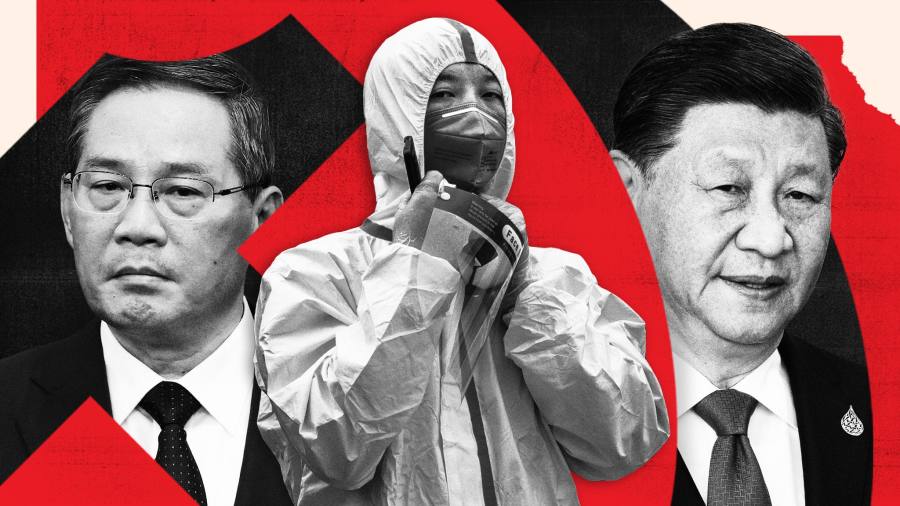As China’s politicians gather, the ghosts of zero-Covid live on

China’s National People’s Congress, the country’s legislature, assembles in Beijing at roughly the same time every year. But this spring, the gathering is timed to perfection. It is the first major political event after the ending of Covid restrictions in December and, as the subsequent wave of infections dies down, it comes at a moment of reopening.
It will nonetheless keep some of the spirit of zero-Covid alive. Journalists who attend its tightly scripted press conferences will need to briefly quarantine beforehand. At an event that deals not in detail but above all in the symbolism of the Chinese Communist party, the fight against the virus cannot be abandoned as abruptly as it was everywhere else.
It is perhaps unsurprising that Covid measures should linger here, given how pandemic restrictions came to consume political decision-making in China. They were the de facto monetary policy that, once lifted, acted as forceful stimulus. They were the humanitarian flourish, contrasted against western negligence. In the regions, they became the key performance metrics for officials hoping to ascend to a position in the capital. Li Qiang, the official who oversaw a two-month lockdown in Shanghai, will now be promoted to the country’s second-most powerful seat.
The pre-NPC quarantine requirement was also imposed at the regional versions of the Congress — a contrast to the complete abandonment of restrictions elsewhere, from airports to offices. So in mid-January, by which point most people I knew had already recovered from the virus, I completed my fourth and shortest quarantine, for 24 hours, at a hotel in Shanghai. It also required three PCR tests taken over three consecutive days, and the completion of a table monitoring your body temperature each morning and afternoon for seven days.
The problem was that PCR testing booths on the street corners had by then mostly been disassembled, along with much of the data (though official estimates claimed there had already been hundreds of millions of infections). I found one hidden away off Nanjing Road. It was around 2pm. “Am I the first person here today?” I asked the hazmat-suited workers. “No,” they replied. “You’re the third”. The test, no longer free, cost Rmb16 ($2.30).
For my next two tests, after scouring the streets on my bike, I came across a booth on Wulumuqi Road, the site of protests against the zero-Covid regime a week before it was abandoned. The worker added me on WeChat to collect my details. “The destination’s the UK?” she asked, assuming I was taking the test for international travel. It’s the Two Sessions, I said. It’s free for the Two Sessions, she explained, with one of those crying-with-laughter emojis, because I’d already paid.
We were taken by bus to a hotel on Saturday afternoon, ahead of a Sunday afternoon press conference. The process of checking in was like a sketch scripted to capture what zero-Covid was actually like. I was supposed to check in on a special app that linked to my test results, but it wouldn’t recognise my passport number. Someone suggested I instead take an antigen test, which we had to do anyway the next morning.
Once in the room, the comic potential waned. Quarantine has its own sensation: the sudden descent of silence after you unpack, the evaporation of the outside world. I read a decent chunk of Nostromo, a book I was supposed to finish two quarantines ago.
The press conference itself was masterfully stripped of content. It was difficult to know whether the officials — the only people not wearing masks — had, like the journalists, needed to isolate. They seemed to live and exist in a separate sphere, a closed-loop, that could not easily be discussed.
Outside that overnight quarantine, nearly all other signs of zero-Covid have disappeared — though masks are still widely worn on increasingly busy streets.
But as China reopens, the ghost of its past endures. One evening I went to play badminton at an old gym in Shanghai, where I found the courts soaking wet. I was almost certain it was disinfectant. I could imagine the person in charge here, under the command of their boss, and in turn anticipating their boss’s boss’s boss, overzealously applying it, all the way back to the party’s Zhongnanhai compound in Beijing.
But fellow players, when I asked, confirmed the real reason. It was a layer of humidity from Shanghai’s heavy winter rains, an annual occurrence which, like the NPC, takes place around the same time every year.
Share this news on your Fb,Twitter and Whatsapp
Times News Express:Latest News Headlines
Times News Express||Health||New York||USA News||Technology||World News